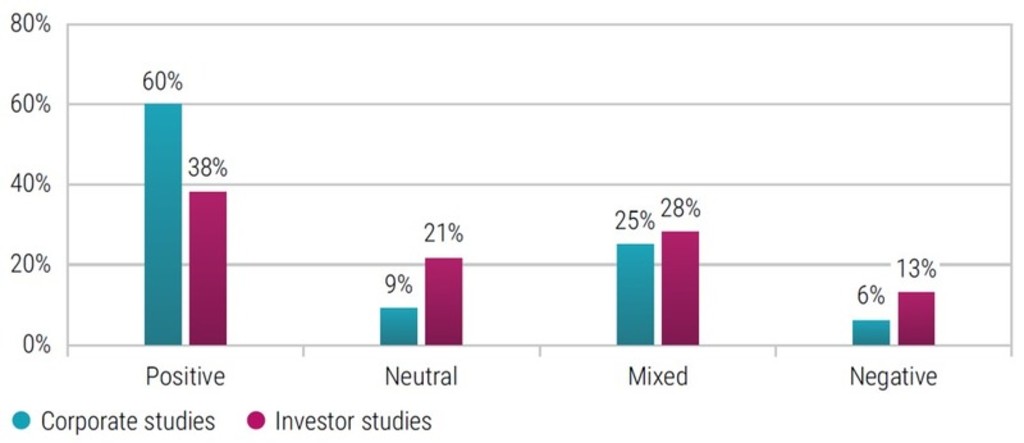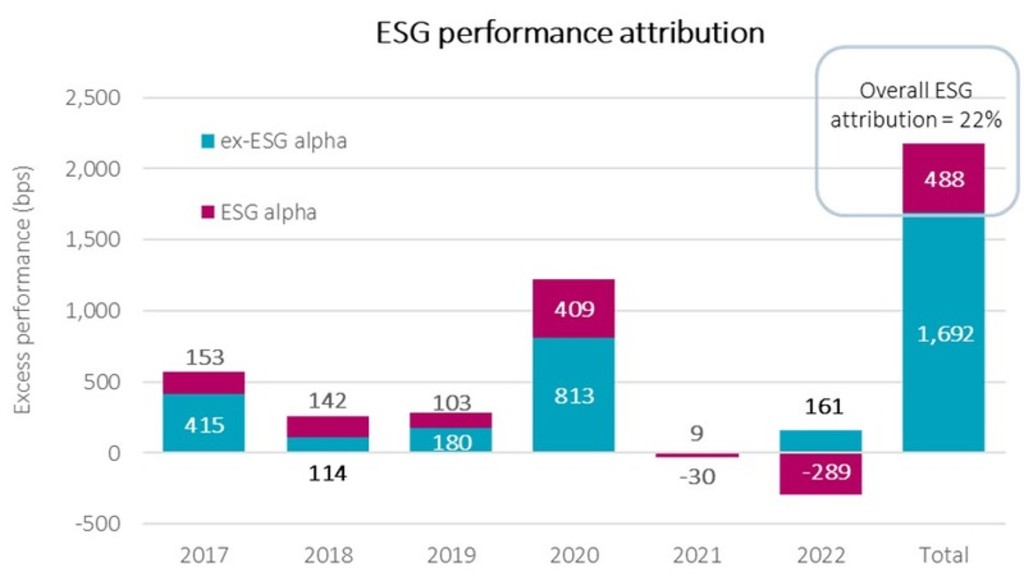

Investigating the link between ESG and investment performance
Half a century of academic research finds that in most cases, companies that apply ESG principles tend to be higher quality and financially superior. Curiously, results are less robust for investment portfolios. We look at possible resolutions to this conundrum and also explain why our convictions on ESG and investments are as strong as ever.
まとめ
- Research shows a positive link between ESG and company financials
- Results less conclusive for investment portfolios
- For some investors, performance is about more than returns
The link between sustainability and company financial performance has been grounded in half a century of academic research. A 2015 meta-study from Friede et al. undertook an exhaustive, quantitative study of the entire universe of 2,250 published academic studies on ESG performance spanning four decades of data from 1970 to 2014. 1
The analysis concluded that ESG correlated positively to corporate financial performance in 62.6% of studies and produced negative results in less than 10% of cases (the remainder were neutral). A 2023 study analyzed company performance from 2015 to 2020. The results were similar, supporting the notion that integrating ESG information into corporate operations and decision-making may add value that translates to better managed companies and better corporate financial performance.2
ESG performance and investment performance
Intuitively, what works for individual companies should also work for investment portfolios. However, while still positive, the link between ESG and overall portfolio returns was less robust. Sustainability data positively influenced portfolio returns in 38% of cases, while a negative influence was found only 13% of the time (see Figure 1). More strikingly, based on portfolio returns at the aggregate, researchers concluded that ESG investing has on average been indistinguishable from non-ESG investing.3 What’s more, other highly influential papers have shown that employing sustainable investing approaches such as exclusions to avoid certain types of stocks (e.g., ‘sin stocks’) actually sacrificed returns.4How can the impact of something that works so well for companies be neutralized when applied to investment portfolios?
How can the impact of something that works so well for companies be neutralized when applied to investment portfolios?
Figure 1 – ESG impact on corporate financials vs investment portfolio performance (2015-2020)

Source: Atz, U. van Holt, T. et al. “Does sustainability generate better financial performance? review, meta-analysis, and propositions.” Journal of Sustainable Finance & Investment, 2022.
Investors preferences steer performance outcomes
One easy explanation is that many ESG investment strategies fail to focus on financially material ESG information. In other words, ESG factors that could have a significant impact – both positive and negative – on a company’s business model and value drivers, such as revenue growth, margins, required capital and risk. Analysts must focus on the right indicators and understand how they impact performance in each sector. For example, environmental indicators such as carbon emissions are more meaningful for energy-intensive industrial manufacturers than for service industries or the financial sector. And as always, it matters whether these material indicators are priced in by the market or not.
Besides financially material ESG information, there are also more complex factors at play that complicate the equation for investment portfolios. Companies focus primarily on profitability, growth and stock price performance. However, many sustainability-minded investors may be driven by other motives than pure profits and returns. Those investors prefer their investments to align with their personal ideologies and normative value systems. That means they may be willing to forgo some financial returns in exchange for higher marks on other portfolio ‘performance metrics’ such as a low-to-no exposure to ‘sin stocks’ such as online gambling outlets, tobacco producers or weapons manufacturers.
Sustainability-minded investors may be driven by other motives than pure profits and returns
Other sustainability-minded investors wish not only to screen out negative companies but also to actively orient their portfolios toward companies meeting ‘higher’ values criteria. These could be thought of as impact investors who wish to see their capital proactively allocated to companies and sectors whose products are positively responding to global concerns. Investment strategies focused on the climate crisis, resource scarcity, habitat degradation as well as workforce inequalities and human rights abuses are all examples of an impact-oriented investment approach.
サステナビリティに関する最新のインサイトを把握
ロベコのニュースレター(英文)に登録し、サステナブル投資の最新動向を探求しましょう。
The Robeco experience – picking winners, avoiding losers, enhancing real-world impact
Robeco is built on decades of sustainability IP that enables us to customize and effectively accommodate a large spectrum of investment objectives and preferences across a range of asset classes. Our core fundamental equities strategies use ESG primarily as a tool to generate alpha. One strategy in particular, the Robeco Sustainable Global Stars Equities strategy, has even calculated an ESG impact attribution, showing that integrating various ESG dimensions into active stock picking has positively contributed to 22% of the strategy’s excess returns between 2017-2022 (see Figure 2). 5
Figure 2 – ESG’s contribution to performance in a sustainable equity portfolio

Source: Robeco, Sustainable Global Stars Equities strategy, 2017-2022
In contrast, our fixed income strategies, which are more oriented toward avoiding defaults, apply ESG analysis to protect against downside risk. In 2022, incorporating ESG into our proprietary fundamental scoring analyses led to a financially material impact in 29% of investment cases, 22% related to downside protection and 6% to capturing unpriced upside in bond prices.
Moreover, the rapidly increasing amount of available data has enabled our quantitative investment teams to develop algorithmic models to harvest financially-material sustainability signals that improve a portfolio’s risk-return profile. As previously noted, investors are increasingly concerned with contributing positive real-world impact in addition to reducing risks, preserving capital or capturing alpha. Recognizing this shift in investor preferences, the quant team has developed a customization tool that optimizes portfolios across expected returns, risk appetite and sustainability characteristics (e.g., carbon footprint, SDG impact).
Vigilance and innovation required
Our conviction of the value generated by sustainability is supported by extensive internal and external research. But we also realize that market dynamics can change over time. As with other forms of analysis the positive impact of any financially-material ESG data on returns can quickly lose its performance edge as more market participants discover and apply its benefits. Vigilance and continuous innovation are needed. We continue to enhance our research capabilities by adding new data sources, building new models and frameworks, and integrating the output within investment strategies across our entire range of asset classes.

The Big Book of Sustainable Investing
This article is based on a chapter in the Big Book of SI.
Footnotes
1 Friede, G. Busch, T. and Bassen, A. “ESG and financial performance: aggregated evidence from more than 2000 empirical studies.” (2015). Journal of Sustainable Finance & Investment, 5:4, 210-233
2 Atz, U. van Holt, T. et al. “Does sustainability generate better financial performance? review, meta-analysis, and propositions.” (2022). Journal of Sustainable Finance & Investment.
3 Atz, U. van Holt, T. et al. “Does sustainability generate better financial performance? review, meta-analysis, and propositions.” (2022). Journal of Sustainable Finance & Investment.
4 Harrison, H. and Kacperczyk, M. (2009). “The price of sin: The effects of social norms on markets”, Journal of Financial Economics, pp. 93-101
5 The Robeco Sustainable Global Stars Equities strategy uses the MSCI World EUR Index as a reference index.
重要事項
当資料は情報提供を目的として、Robeco Institutional Asset Management B.V.が作成した英文資料、もしくはその英文資料をロベコ・ジャパン株式会社が翻訳したものです。資料中の個別の金融商品の売買の勧誘や推奨等を目的とするものではありません。記載された情報は十分信頼できるものであると考えておりますが、その正確性、完全性を保証するものではありません。意見や見通しはあくまで作成日における弊社の判断に基づくものであり、今後予告なしに変更されることがあります。運用状況、市場動向、意見等は、過去の一時点あるいは過去の一定期間についてのものであり、過去の実績は将来の運用成果を保証または示唆するものではありません。また、記載された投資方針・戦略等は全ての投資家の皆様に適合するとは限りません。当資料は法律、税務、会計面での助言の提供を意図するものではありません。 ご契約に際しては、必要に応じ専門家にご相談の上、最終的なご判断はお客様ご自身でなさるようお願い致します。 運用を行う資産の評価額は、組入有価証券等の価格、金融市場の相場や金利等の変動、及び組入有価証券の発行体の財務状況による信用力等の影響を受けて変動します。また、外貨建資産に投資する場合は為替変動の影響も受けます。運用によって生じた損益は、全て投資家の皆様に帰属します。したがって投資元本や一定の運用成果が保証されているものではなく、投資元本を上回る損失を被ることがあります。弊社が行う金融商品取引業に係る手数料または報酬は、締結される契約の種類や契約資産額により異なるため、当資料において記載せず別途ご提示させて頂く場合があります。具体的な手数料または報酬の金額・計算方法につきましては弊社担当者へお問合せください。 当資料及び記載されている情報、商品に関する権利は弊社に帰属します。したがって、弊社の書面による同意なくしてその全部もしくは一部を複製またはその他の方法で配布することはご遠慮ください。 商号等: ロベコ・ジャパン株式会社 金融商品取引業者 関東財務局長(金商)第2780号 加入協会: 一般社団法人 日本投資顧問業協会
































